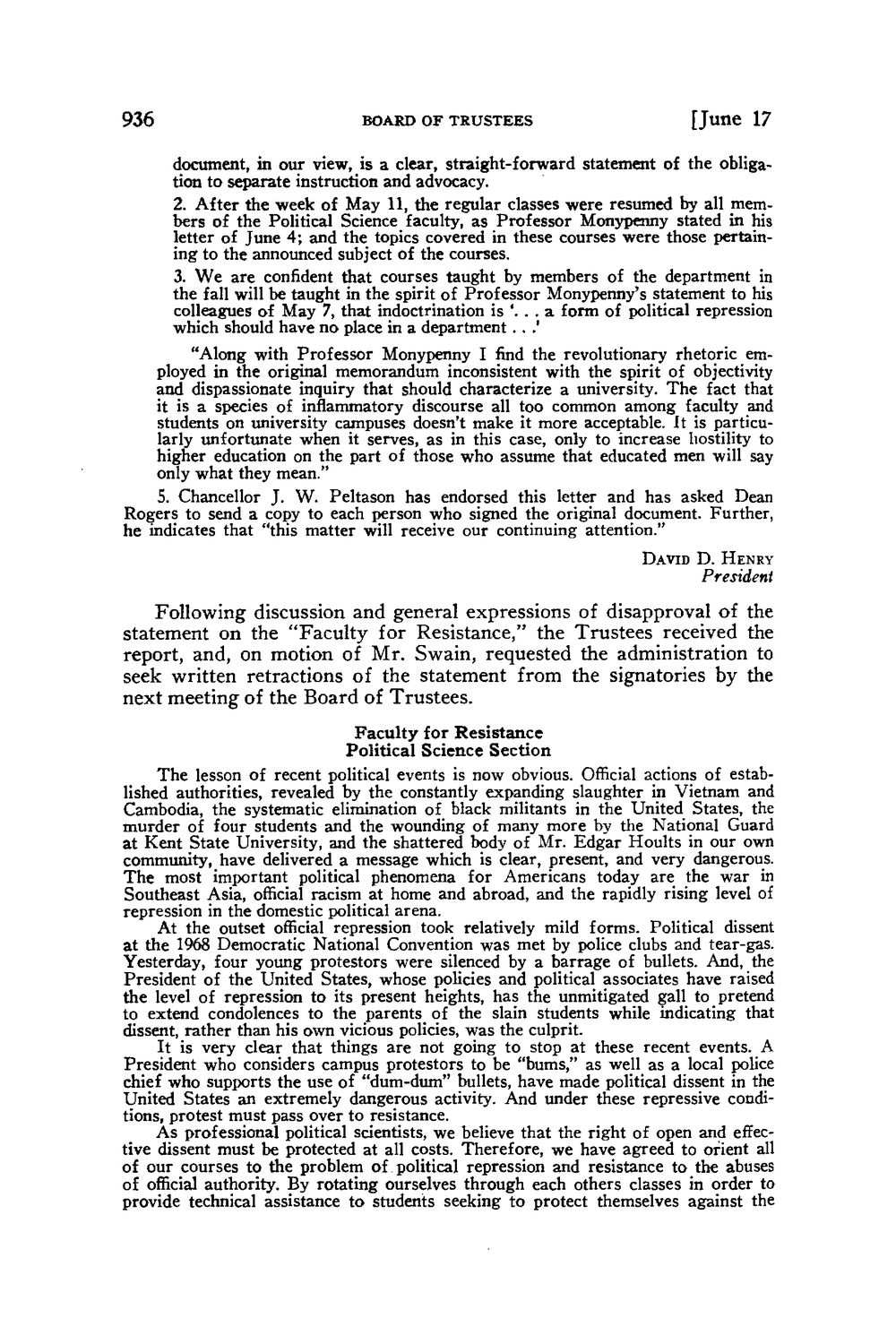| |
| |
Caption: Board of Trustees Minutes - 1970
This is a reduced-resolution page image for fast online browsing.

EXTRACTED TEXT FROM PAGE:
936 BOARD OF TRUSTEES [June 17 document, in our view, is a clear, straight-forward statement of the obligation to separate instruction and advocacy. 2. After the week of May 11, the regular classes were resumed by all members of the Political Science faculty, as Professor Monypenny stated in his letter of June 4; and the topics covered in these courses were those pertaining to the announced subject of the courses. 3. We are confident that courses taught by members of the department in the fall will be taught in the spirit of Professor Monypenny's statement to his colleagues of May 7, that indoctrination is '. . . a form of political repression which should have no place in a department . . .' "Along with Professor Monypenny I find the revolutionary rhetoric employed in the original memorandum inconsistent with the spirit of objectivity and dispassionate inquiry that should characterize a university. The fact that it is a species of inflammatory discourse all too common among faculty and students on university campuses doesn't make it more acceptable. Jt is particularly unfortunate when it serves, as in this case, only to increase hostility to higher education on the part of those who assume that educated men will say only what they mean." 5. Chancellor J. W. Peltason has endorsed this letter and has asked Dean Rogers to send a copy to each person who signed the original document. Further, he indicates that "this matter will receive our continuing attention." DAVID D. HENRY President Following discussion and general expressions of disapproval of the statement on the " F a c u l t y for Resistance," the Trustees received the report, and, on motion of M r . Swain, requested the administration to seek written retractions of the statement from the signatories by the next meeting of the Board of Trustees. Faculty for Resistance Political Science Section The lesson of recent political events is now obvious. Official actions of established authorities, revealed by the constantly expanding slaughter in Vietnam and Cambodia, the systematic elimination of black militants in the United States, the murder of four students and the wounding of many more by the National Guard at Kent State University, and the shattered body of Mr. Edgar Hoults in our own community, have delivered a message which is clear, present, and very dangerous. The most important political phenomena for Americans today are the war in Southeast Asia, official racism at home and abroad, and the rapidly rising level of repression in the domestic political arena. At the outset official repression took relatively mild forms. Political dissent at the 1968 Democratic National Convention was met by police clubs and tear-gas. Yesterday, four young protestors were silenced by a barrage of bullets. And, the President of the United States, whose policies and political associates have raised the level of repression to its present heights, has the unmitigated gall to pretend to extend condolences to the parents^ of the slain students while indicating that dissent, rather than his own vicious policies, was the culprit. It is very clear that things are not going to stop at these recent events. A President who considers campus protestors to be "bums," as well as a local police chief who supports the use of "dum-dum" bullets, have made political dissent in the United States an extremely dangerous activity. And under these repressive conditions, protest must pass over to resistance. As professional political scientists, we believe that the right of open and effective dissent must be protected at all costs. Therefore, we have agreed to orient all of our courses to the problem of political repression and resistance to the abuses of official authority. By rotating ourselves through each others classes in order to provide technical assistance to students seeking to protect themselves against the
| |